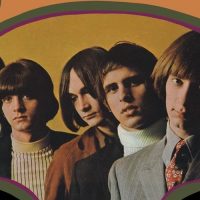Supposedly written on the day Graham Nash broke up with Joni Mitchell, “Simple Man” is among the most heart-breaking piano ballads ever written. It opens side two of his brilliant 1971 solo debut Songs for Beginners, which has been unfairly neglected among the barrage of early-’70s singer-songwriter albums.
Songs for Beginners is a folk-rock masterpiece with two faces. Its rousing political anger harkens back to the 1960s, with songs like “Military Madness” and “We Can Change the World.” Yet its intensely personal songs of love and loss — among them “Better Days” (with Neil Young on piano), “Sleep Song” and “Wounded Bird” — seem to prefigure the 1970s’ turn to more introspective songwriting.
“Simple Man” clearly belongs to the latter category. It’s a slow-paced ballad that opens with a simple piano riff on a suspended 2nd, a chord that always seems to evoke sadness and nostalgia. Harmony vocals and a country fiddle further set the scene for a painfully honest history of lost love. “Wish that I could see you once again across the room like the first time,” Nash sings in one of the song’s most piercing lines.
“Simple Man” is a song about longing. The verbs are telling: “wish that I could see you … just wanna hold you.” The beauty is that Nash stays with this feeling of longing and want, even though it’s almost unbearable in its intensity. He doesn’t dilute it with wish-fulfillment fantasies. There’s no vain “you should have” or “I should have,” no bitterness or hurt pride. There’s just this: a heart that longs for what’s been lost.
They say that love makes blind, but I never bought that. Life makes blind; in love we see again. Yet the vision may be so bright and so sudden, and its loss so painful, that we come up with stories to comfort us. It was all an illusion, we say, a temporary madness that beset us, and we´re glad to be back in reality. Yet the heart remembers what it has seen.
A song like “Simple Man,” with its piercing honesty, its refusal to flee in falsifying stories, has the potential to bring us back to the original vision — that momentary flash of lightening when, perhaps, we saw life more clearly than we ever will again.
- Why Warren Zevon Shouldn’t Only Be Remembered For a Novelty Single - September 7, 2023
- Thanksgiving Songs From Bob Dylan, Joan Baez + Others: Gimme Five - November 25, 2021
- Dory Previn, “The Lady With the Braid” (1971): One Track Mind - November 27, 2019




